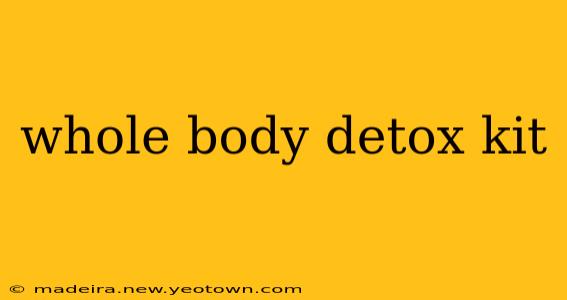The promise of a quick and easy whole body detox is alluring. We live in a world bombarded by toxins – from the air we breathe to the food we eat. It's no wonder the idea of a simple kit that can cleanse our systems and leave us feeling refreshed and rejuvenated is so appealing. But do these kits really work as advertised? Let's dive into the world of whole body detox kits, separating the science from the sensationalism.
My name is Alex, and I've spent years researching holistic wellness and the efficacy of various detox methods. I'm here to help you navigate the often confusing landscape of detox products and empower you to make informed choices about your health.
What is a Whole Body Detox Kit?
Typically, a whole body detox kit contains a combination of products designed to flush out toxins from your body. These might include:
- Herbal teas: Often touted for their diuretic and cleansing properties.
- Supplements: Such as antioxidants, probiotics, or fiber, aiming to support gut health and overall detoxification processes.
- Cleanse drinks or powders: These often contain ingredients like lemon, ginger, or other purported detoxifying agents.
The marketing behind these kits often paints a picture of dramatic results – rapid weight loss, increased energy, clearer skin – all within a short period. However, the reality is far more nuanced.
Do Whole Body Detox Kits Actually Work?
The truth is, your body already has a remarkable built-in detoxification system. Your liver, kidneys, lungs, and skin work tirelessly to eliminate waste products and harmful substances. While supporting these organs with a healthy lifestyle is crucial, there's limited scientific evidence to support the claims made by many detox kits.
Many of the ingredients in these kits do possess individual health benefits. For example, antioxidants can help protect cells from damage, and probiotics are essential for a healthy gut microbiome. However, these benefits are not necessarily amplified by combining them in a specific kit, and the overall effect on "detoxification" remains questionable.
What are the Risks Associated with Whole Body Detox Kits?
While generally considered safe when used as directed, some risks are associated with using whole body detox kits:
- Misinformation and misleading claims: Many kits make exaggerated claims that aren't supported by scientific evidence.
- Interactions with medications: Some ingredients in detox kits may interact negatively with prescription or over-the-counter medications.
- Nutrient deficiencies: Some detox diets or cleanses can be restrictive, potentially leading to nutrient deficiencies.
- The placebo effect: The feeling of improvement after using a detox kit may be due to the placebo effect rather than the kit itself.
What are the natural ways to support your body's detoxification processes?
Instead of relying on potentially dubious detox kits, focus on these proven methods to support your body's natural detoxification processes:
- Drink plenty of water: Water is essential for flushing out toxins.
- Eat a balanced diet: Focus on fruits, vegetables, and whole grains.
- Exercise regularly: Physical activity helps boost circulation and supports detoxification.
- Get enough sleep: Sleep is crucial for cellular repair and regeneration.
- Manage stress: Chronic stress can impair the body's detoxification processes.
What are some common ingredients in whole body detox kits?
Common ingredients include:
- Milk Thistle: Often touted for its liver-supporting properties.
- Chlorella: A type of algae believed to bind to toxins and help eliminate them.
- Ginger: Known for its anti-inflammatory and digestive benefits.
- Lemon: A source of vitamin C and antioxidants.
Are there any long-term benefits to using a whole body detox kit?
There's no scientific evidence supporting long-term benefits beyond the potential benefits of individual ingredients if consumed as part of a healthy diet. Focus on sustainable lifestyle changes rather than relying on quick-fix solutions.
What is the difference between a whole body detox and a colon cleanse?
While both are marketed as detoxification methods, they target different areas. A whole body detox aims to cleanse the entire body, while a colon cleanse focuses specifically on the colon. The effectiveness and safety of both are debated within the scientific community.
In conclusion, while the concept of a whole body detox is appealing, relying on commercially available kits is often unnecessary. Your body is equipped to handle detoxification effectively. Prioritizing a healthy lifestyle, including balanced nutrition, regular exercise, sufficient hydration, and stress management, is the most effective way to support your body's natural cleansing processes. Remember to consult your doctor before starting any new diet or supplement regimen.

